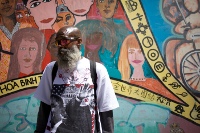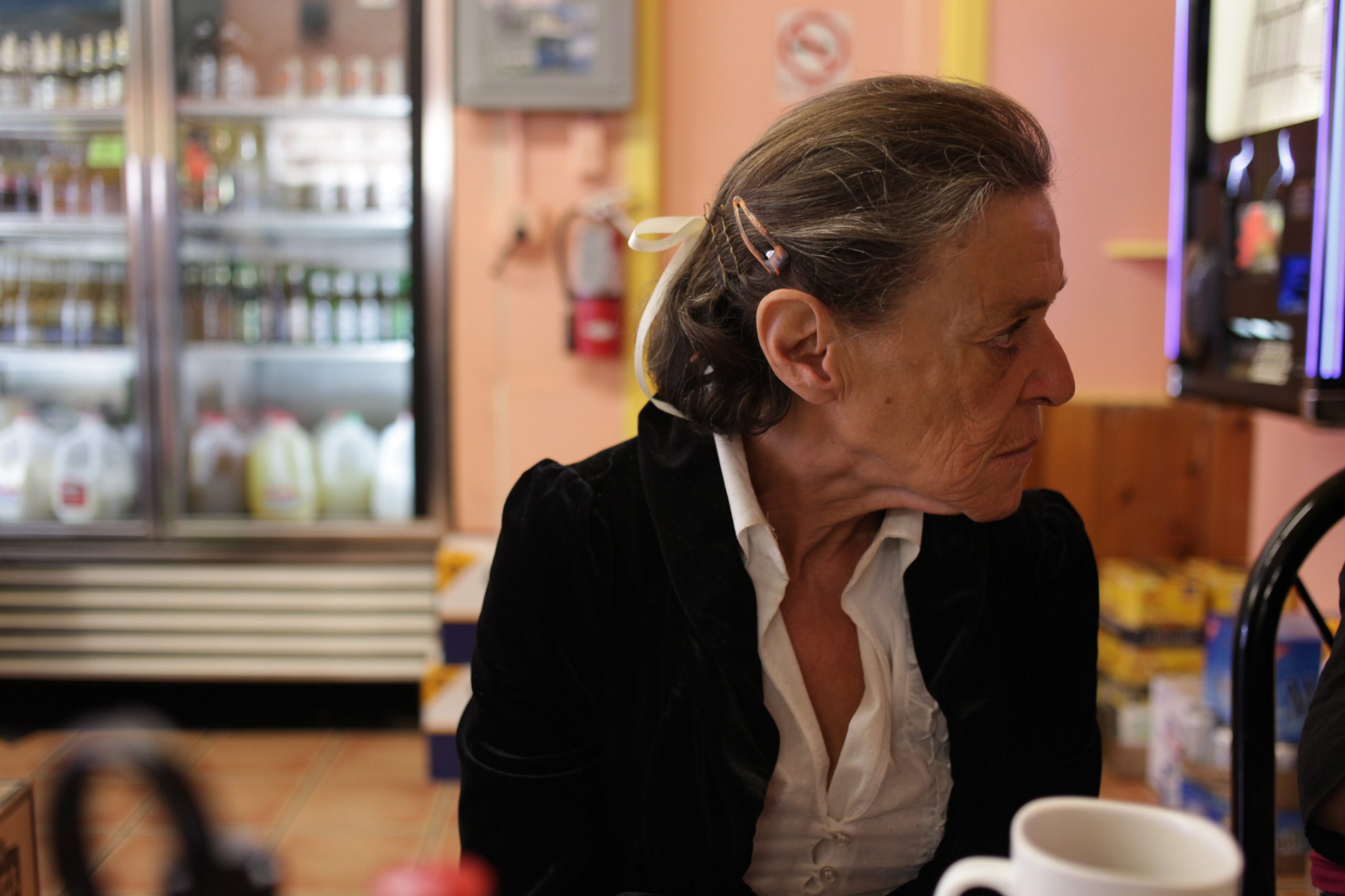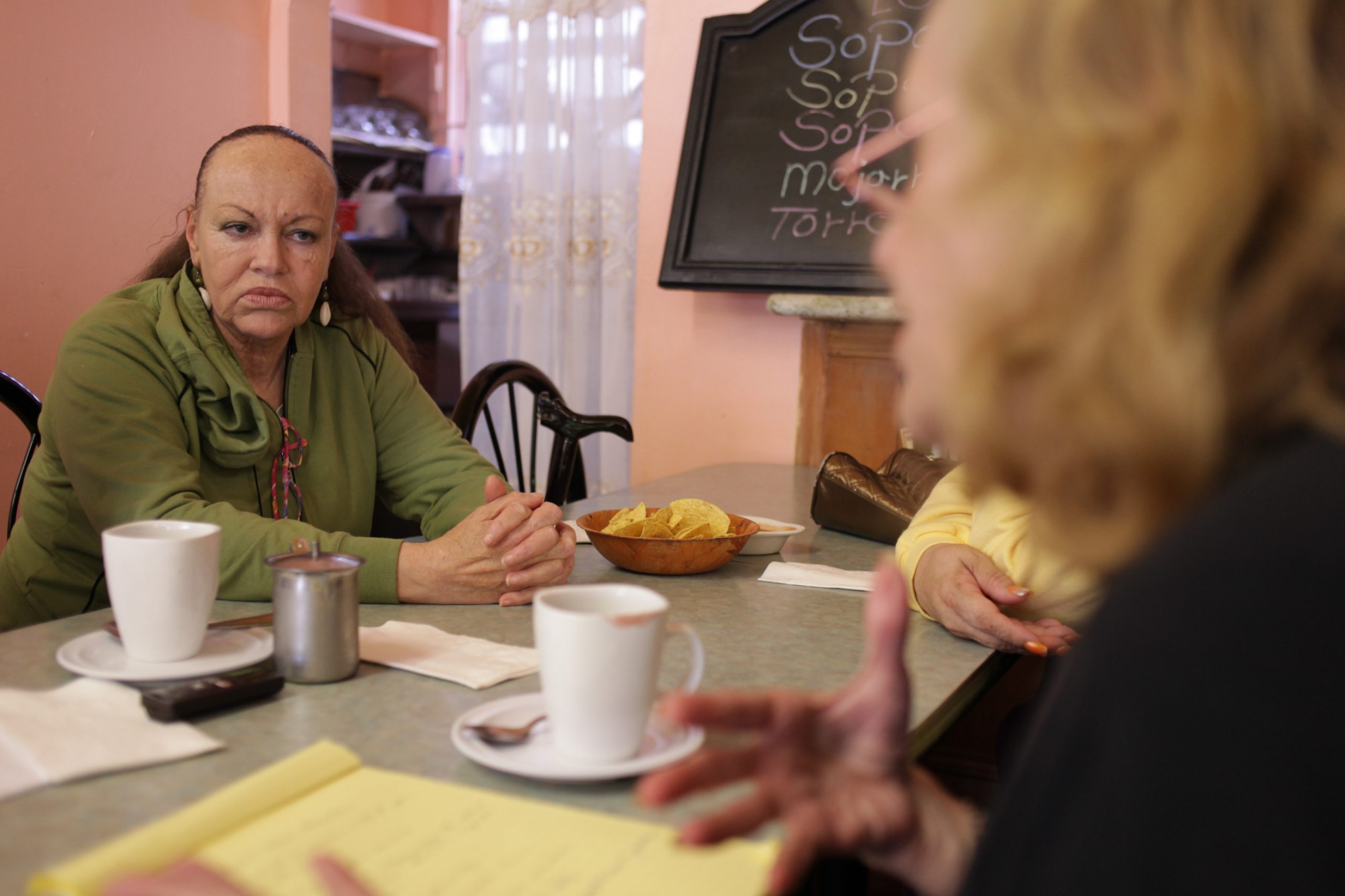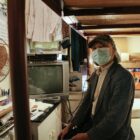Part of the community-funded City Budget Watchdog series
 |
| Michael DeCarlo Wright is a Tenderloin Self Help Center cleint who could lose job search services he has used for many years. Photo by Monica Jensen/The Public Press. |
Hundreds of San Francisco’s most vulnerable people — the mentally ill, homeless, and seniors among them — will be pushed out of the social services safety net and even further into the margins if proposed cuts to the Department of Public Health go through.
San Francisco is facing one of the largest budget deficits in recent memory, and city politicians are scrambling to balance the budget with the least amount of pain. Mayor Gavin Newsom has proposed slashing more than $169 million from the health department’s share of city general funds as city leaders try to bridge a $438 million deficit this month.
Behavioral health services — including counseling, mental health treatment and addiction and vocational services — would be some of the hardest hit under this plan.
Until a final draft of the budget is approved, it is impossible to say exactly how many will be affected by the proposed cuts. The health department says that at least 1,500 uninsured people would lose access to behavioral health services if the mayor’s budget is approved. That number could grow much larger if cuts force the closure of centers that see hundreds of needy people every day.
"The cuts we are looking at now are more devastating than San Francisco has ever seen," said Jackie Jenks, executive director of Central City Hospitality House, which is slated to lose funding under the proposal. "They are really dismantling a system that has been built up over 30 to 40 years."
San Francisco’s public health system "has taken decades to put together," said Steven Tierney, a city health commissioner and director of the Community Mental Health Program at the California Institute of Integral Studies. "The reality is that we are now having to dismantle that system because of the economy."
If the Board of Supervisors has its way, however, the health department will be spared some of the proposed cuts, with more money instead coming out of public safety budgets, including police and fire services.
City and health department officials say that cutbacks are unavoidable and necessary in order to keep the city’s core services intact. As the supervisors and the mayor’s office wrangle over budget proposals, few look forward to the day the cuts are finalized.
"Nonprofits are going to close over this," said Jim Illig, president of the San Francisco Health Commission, which reviewed the health department’s budget proposal. "The health commission does not want to be cutting these programs. But our job is to help the mayor present a balanced budget."
If the cuts are approved, some nonprofits could shut down as early as Aug. 1. The Tenderloin Self Help Center, which provides 2,500 people with drop-in substance abuse counseling and job and housing assistance, is one of them. The decades-old center would lose $652,000 under the proposed budget — leaving it without enough funding to keep its doors open.
Tenderloin Self Help Center from Monica Jensen on Vimeo.
[The Public Press’ Monica Jensen visited the Tenderloin Self Help Center and met some of the clients threatened by budget cuts.]
After he fell ill and lost his job seven years ago, Porter Davis ended up on the street. Lacking health insurance or disability benefits, Davis turned to Tenderloin Self Help.
"I was on welfare and struggling just to find a place to stay and to be able to continue to access the health care system," Davis said.
If the Tenderloin center closes, other drop-in programs might not be able to handle the increased caseload. Last year, Tenderloin Self Help saw 13,500 people, and visits spiked in the last six months as the economy worsened.
"We used to see about 200 to 300 people a day, and now we see 300 to 400 people a day," said Jenks of Central City Hospitality House, the parent organization for the Tenderloin Self Help Center.
Tenderloin Self Help is a low-threshold provider, meaning it does not record personal information about its clients. While this allows the organization to service a community of chronically homeless people skeptical of traditional mental health organizations, it also disqualifies the center from receiving Medi-Cal funding, leaving it more vulnerable to budget cuts.
Jenks said the services her center provides should be considered emergency support — one of the core services the Department of Public Health sets out to preserve.
"I don’t know how one could not categorize what we are doing every single day as emergency services," Jenks said. "We have people come in who are in severe mental health crisis, who are overdosing on drugs."
 |
Barbara Bosely, 71, said she’d do anything to keep Southeast Mission Geriatric Services in its current location. She had just heard about the proposed relocation to OMI on Ocean Avenue. Photo by Monica Jensen/The Public Press. |
Kavoos Bassiri, CEO of Richmond Area Multi-Services, Inc., a nonprofit health agency that specializes in serving Asian and Russian communities, worries that the budget process is determining health department priorities. "I am concerned that so much of the cuts are from behavioral health services," he said. "I think there are proportionally higher cuts to behavioral health services."
Bob Cabaj, director of Community Behavioral Health Services at the Department of Public Health, said behavioral health services currently receive a disproportionately high amount of money from the city’s general fund. A heavy reliance on general funds means that these services suffer more during a fiscal crisis.
"We recognize that there will be a service reduction, but community behavioral health services is going to work closely with primary care to address more of the needs at primary clinics," Cabaj wrote in an e-mail.
The Department of Public Health followed principles developed by the health commission to design recent budget proposals. "The department’s priorities in wanting to preserve the safety net services from San Francisco General Hospital, Laguna Honda Hospital and the medical homes in our community clinics left the department with very narrow choices," Cabaj wrote.
To optimize available funds, the health department wants to integrate behavioral health services with primary care — where patients see one physician for all their health needs — and to preserve core services including disease control, emergency services and hospitalization.
But even among behavioral health programs spared devastating funding cuts, there could be major changes. Southeast Mission Geriatric Services is one of four centers in the city that specializes in behavioral health care for older adults. Housed in a small, inconspicuous building in the outer Mission, the 25-year-old center serves more than 270 clients 60 and older, according to a staff-produced fact sheet. (Community Behavioral Health Services, however, lists that number as 187.) Just three social workers staff the clinic on a regular basis.
Under the latest budget proposal, the center’s Mission Street location will be closed, and its program and staff will relocate to the OMI Adult Behavioral Health clinic on Ocean Avenue. Southeast Mission Geriatric’s caseload over the past two years has "increased to a high, unmanageable level" due to staffing reductions to address budget shortfalls, Cabaj wrote.
However, the program at Southeast Mission Geriatric is better off than many, Cabaj said, as it will not suffer cuts, but merely a relocation. Shuttering the Mission Street clinic and relocating most of its staff to OMI will bolster the capacity of the program, Cabaj said, adding that the new location will be more convenient for clients to get to — a claim clinic staff and clients dispute.
Southeast Mission Geriatric Center from Monica Jensen on Vimeo.
[The Public Press’ Monica Jensen visited the Tenderloin Self Help Center and met some of the clients threatened by budget cuts.]
Several Southeast Mission Geriatric clients said in interviews that location matters, and that some won’t be able to get to OMI to seek help.
"I would take three buses to get there," said Meshá Mongé-Irizarry, 61, a diabetic client who sometimes uses a cane to walk. "I’m not gonna make it."
Clients also worry about lack of privacy at OMI, a larger facility that sees people of various ages.
Lidiette Ayala, 72, said that her mental illness would make relocation difficult. "If they close the center and move I would have a problem, because I have agoraphobia," said Ayala, who has been coming to the center for nearly a decade and also struggles with depression.
"Change is trauma," and trauma would make her depression worse, said Kay Livingston, 62, another client.
"I don’t want to go backward, I want to go forward," she said. "They always cut psychiatric services, and seniors."
 |
| "How much healing would I get emotionally when I’m putting myself through four hours of bus transportation that is hurting my physical health?" said Meshá Mongé-Irizarry, when asked about the relocation of Southeast Mission Geriatric Services proposed in the latest budget. Photo by Monica Jensen/The Public Press. |
Barbara Bosley, 71, has used the Southeast Mission Geriatric center for 15 years. She said she feels at home at the Mission Street clinic, which is small, quiet and conveniently located. "It’s really helped me a lot. I’d be in a hospital if I didn’t have it. I need it," said Bosley, whose services are covered by Medi-Cal.
Southeast Mission Geriatric staff declined to be interviewed for this story. But at a May 29 community meeting with District 11 Supervisor John Avalos, Francisca Oropeza, a psychiatric social worker at Southeast Mission Geriatric, voiced her feelings bluntly.
"I prevent people from killing themselves, that’s my job," Oropeza said. "And I need the Department of Aging and the Board of Supervisors and the people creating the budget to look at other places they can cut."
CORRECTED: A previous version of this story misspelled the last name of a source – Francisca Oropeza.










